Are you a Quiet Speculation member?
If not, now is a perfect time to join up! Our powerful tools, breaking-news analysis, and exclusive Discord channel will make sure you stay up to date and ahead of the curve.
This week my intent was to discuss the financial impact of some of the recently spoiled, influential M13 cards. As many have noticed, at the time of this writing, this set has thus far been significantly underwhelming in this regard.
[Editor's note: the full M13 set has been fully spoiled since Sigmund wrote this article, so expect his thoughts soon! In the meantime, be sure to visit the forums to stay on top of the community's conversations.]
There appear to be a great many spoiled cards geared towards casual and EDH players. Wizards of the Coast is certainly highlighting their dedication to the EDH player within M13 by reprinting favorites Akromas Memorial and Gilded Lotus. Additionally, there are by my count eleven cards which cost seven mana or more (I included Door to Nothingness, which does nothing without a 10 mana investment, and Diabolic Revelation, which is absolutely terrible if cast for six mana).
So where does this leave me? Frankly, it leaves me with either an inconsequential M13 article or a need to audible. Guess which one I chose…
Emotion and Magic
This week it gets personal. Through a series of anecdotes and reflections I want to describe some of my own emotions about this collectible card game as well as where strong emotion has helped and hurt me financially.
For those of you hoping for the next list of cards to acquire, I may mildly disappoint this time. I will try to sprinkle some recommendations throughout the article with my tried and true blacklotusproject.com charts. This may or not be satisfactory, but, in either case, I hope readers at least have an appreciation for my honesty and candidness.
The Beginning – Visions
I did not seek out the game of Magic – it found me. Around the time Visions was released my father remarried my Stepmother (although rumor has it the events are unrelated) and I suddenly had a Stepbrother one year older than me. His favorite hobby at the time was this collectible card game called “Magic”.
I asked my father for some cards for my birthday and before I knew it I was spell-slinging left and right. I even won my very first game thanks to a poor keep on my Stepbrother’s part. My first $5+ card was Desertion, simultaneously teaching me that these cards can have cash value and that blue was the strongest color.
Funny enough, thanks to EDH Desertion is once again a $5+ card and a fairly stable pick-up at that. The card is easy to grab in trades and even buy-lists to retailers well (chart courtesy of blacklotusproject.com)
Looking back I realize this was a tumultuous time for me. My father had just remarried and moved far away, meaning I would see him much less frequently. My mother, whom I was living with, moved to a new town and so I had to start a brand new school and make all new friends. I was rather lost.
Magic: The Gathering really helped me stabilize. Through this hobby I not only connected with my Stepbrother, but I also met some of the best friends of my life in other Magic players at school. These memories are all positive and the emotional strength I garnered from Magic is a cornerstone of who I became in my new Middle School. These kinds of feelings towards the game are, in my opinion, 100% acceptable and even encouraged – it drives a type of respected passion for the hobby.
And although we were mostly ignorant about card prices, valuing Craw Wurm at one dollar and Lord of the Pit at infinite, we still loved the game for what it was to us at the time – a way to connect with friends in a familiar way.
Casual Years – Visions – Time Spiral (yes, Time Spiral)
My first nine years playing Magic were strictly casual. My friends and I would get together on the weekends and play countless multiplayer games attempting to outplay one another with our Craw Wurms, Dark Banishings and Counterspells. I remember I used to collect Wurms, and my prized possession was Warping Wurm, which I thrillingly opened in a Mirage pack.
My play during this time period was not consistent – sadly, I did not play Magic at all during Urza’s Saga block or Mercadian Masques block. Happily, I also missed Mirrodin block years later. My interest in the game fluctuated much like the value of a highly speculative card.
Because my enjoyment of this game was strictly on a casual level, I made some poor decisions from a financial perspective during this time. For one, my friends and I absolutely hated opening rare mana-fixing lands. They could never win us the game nor gain the respect of our circle, so we tended to trade them away. Sadly, I owned two Dual Lands which met this fate – a Tropical Island and a Plateau.
I also sold many of my constructed playable cards on eBay during my time in college. In 2004 I happily sold my three moderately played Force of Wills for $28 shipped on eBay. And that awful land Wasteland sold for over $10! Score!
Let’s see how those sales turned out for me according to blacklotusproject.com…
Yeah… sort of reminds you of Apple’s stock price, doesn’t it?
During this phase my mind was often removed from the game of Magic. As a result, I made poor financial decisions within the game. The moral – if you intend to stay in the game in any capacity, at least pay attention to financial trends on a macro level. There is no need to know the weekly fluctuations on card values, but if I had even considered reading some online articles (or InQuest Magazine, which still existed), I would have readily observed price trends. With a little more financial acuity, I could have saved myself from costly mistakes.
Time Spiral to Present – Finance and Competitive Magic
My first ever Friday Night Magic was a triple Time Spiral draft back in 2007. I was absolutely crushed week after week – both in the tournament and at the trade tables. I was beginning to notice trends in card pricing and the driving forces behind these trends, but I still allowed my casual side to drive trading decisions. I was thrilled to pick up my first Psionic Blast… right before it rotated out of Standard. I also opened a ton of Legions packs around this time with the hopes of opening Akroma, Angel of Wrath. Never happened.
The problem was I did not embrace MTG finance as a separate entity. I was too emotional about the game and my decisions were influenced by this. I couldn’t bring myself to trade away the cards I loved and, at the same time, I would overpay for cards I really wanted.
This is where emotion needs to be kept in check. In the extreme case, retailers hold almost no emotion for their cards. This is absolutely necessary – if they were emotional they would surely make poor pricing moves constantly.
Most of us aren’t retailers, so we are allowed some emotional attachment. It is okay to splurge once in a while, as long as the majority of our decisions are rational. Was I even playing the Psionic Blast when I acquired it, for example? Nope – I just loved the artwork and classic feel. Should I have just waited another couple months to acquire the card at $3 instead of $20? You bet.
Emotions – A Double Edged Sword?
In my last article I talked about how one should not hold emotional attachment to their cards because it’s bad for business. That was poorly stated on my part. The truth is most of us aren’t businesses and we play the game for some level of enjoyment. Subsidizing the hobby through savvy financial moves is great, but the big picture cannot be ignored.
Let me therefore propose a slightly alternate approach. Identify the cards in your collection to which you are emotionally attached. If you’ve always wanted a Gaeas Cradle, it’s perfectly fine to sink the $60 it would take to acquire the card right now. Need the latest Angel card to keep your collection complete? Pre-ordering the card from Star City Games may be costly, but it’s reliable and instantly gratifies.
The key is to keep these emotional attachments in check and reasonable. All other cards, and I would go as far as to say this should include every Standard card you own, should remain up for trade. I single out Standard cards specifically because the vast majority of them dip in price at some point, especially near rotation. Even Legacy staples like Noble Hierarch dip at rotation before picking up again.
If you are patient enough, you can acquire most cards at a cheaper price than what you unload them at. That is why I recommend the “nothing is sacred” approach. I would never trade away my Angel collection because of how much time and energy I put into acquiring all these cards. But if someone needed my set of Force of Wills badly enough and I wasn’t using them, I’d be perfectly fine trading them away at retail prices (for example) for a set of Gaeas Cradles.
Many people struggle with how expensive the game has become, especially for the emotionally involved player. As someone who used Magic: The Gathering as a source of stability and friendship during a difficult time, I have just as much emotional involvement in the game as anyone else. But, through some disciplined research and rational thinking, I have been able to apply basic financial principles to my buying, selling and trading to make the game more affordable than ever. This is possible without sacrificing all the joys of having a prized collection worth sharing.
-Sigmund Ausfresser
@sigfig8


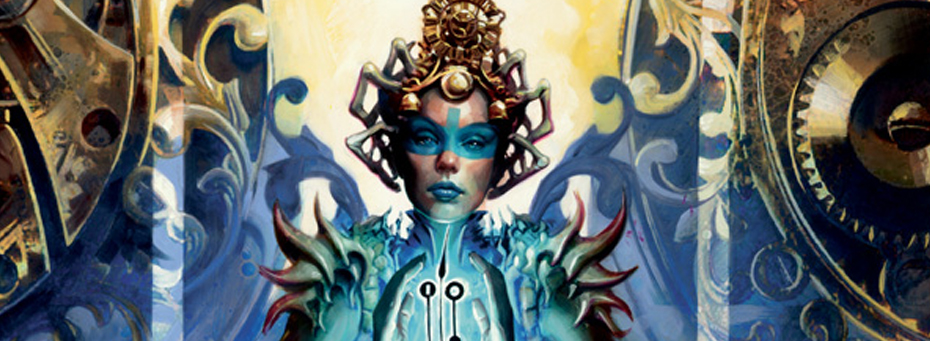

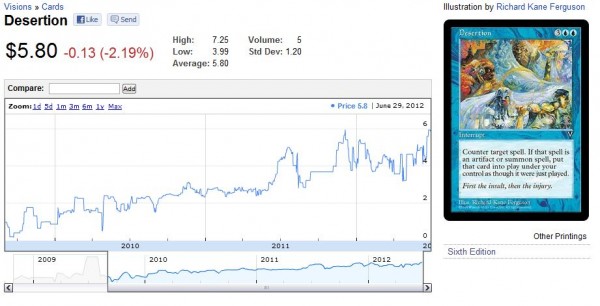
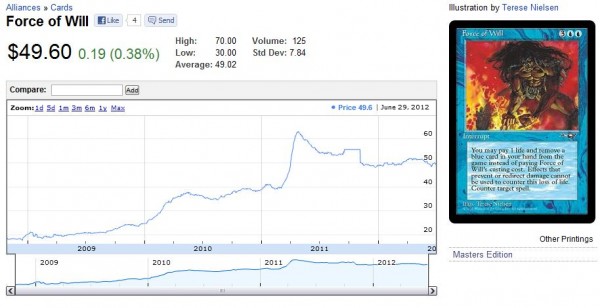
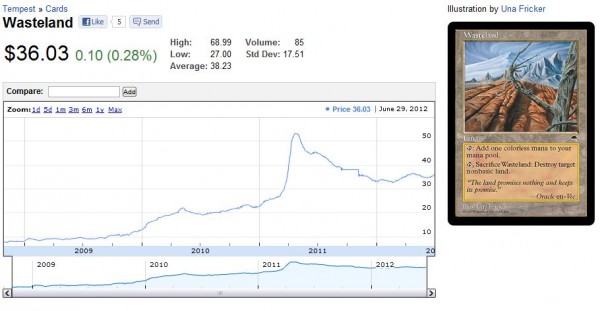
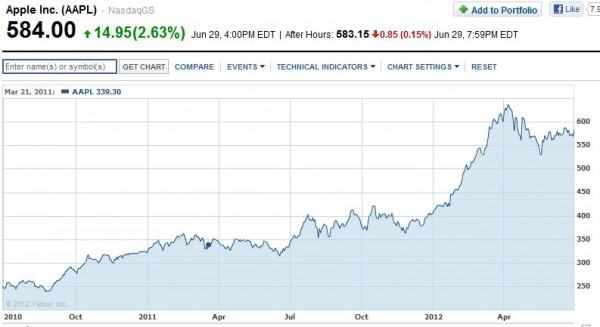
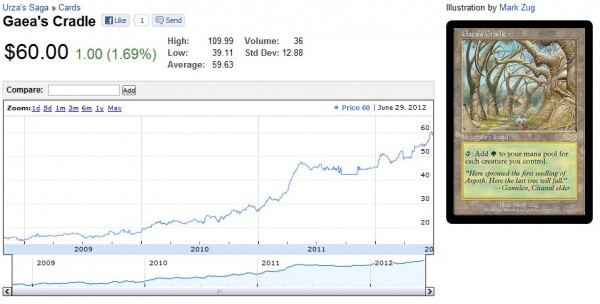


(I have split up this comment as the system wouldn’t take it as one).
I was taught Magic by people who dealt more than they played around the time of Tempest and 5th Edition. I quickly went looking for a good source of prices as their suggested deals looked to be to my disadvantage. It was highly important that I'd arm myself with knowledge quickly. Online I found the Cloister's Trading Card Price Lists (http://www.hhhh.org/cloister/pricelists/ Have a look if you're feeling nostalgic), which was a precursor to MOTL.
I would just print a copy of his list and have it with me. Printed at the smallest possible font. I am near-sighted, which meant that the prices were readable for me if I took off my glasses, but not for many others.
With the help of this eBay list, inquest and a good memory I managed to keep them honest and even manged to reverse the table later on when I grew more knowledgeable than them. Most of them quit the game when rarities were being shown on cards with the release of Exodus.
At this point I was hooked on the game and on dealing. I had built 2 decks in the very beginning of my Magic playing, had worked on another that became obsolete because of the banning of Dream Halls and finally managed to build a 3rd deck. These were all the decks I had for years. On the other hand I would regularly trade with people, some of whom I had taught the game and others who I met at a local event.
It turned out I was pretty good at trading. As I was not making new decks nor changing those I had, pretty much my entire collection was available for trade (except for my playset of Birds of Paradise and some of the cards from the first few packs I opened). By 2000-2001 I owned, or had owned, several Duals, Mana Drain, Moat, a Library, pretty good for someone still in high school and a year later I was even trading for Power, which I subsequently turned into a large part of a playset of Duals. I’ll admit, I was a bit of a shark back then, though not as bad as some.
Apparently somehow the script used for posting these comments messed up the link, remove "http://(" at the beginning of the link and it should work.
This was the time I went to the university. I was a unique new student: I knew (almost) all the games they played there, including Magic. There were many casual players there and a few competitive ones. More opportunity for trading! This also reignited my interest in building decks. I also introduced the proto format there, which is basically buying a starter, shuffling it up and playing with it, for ante and signing the cards you lose. My proto decks would normally grow out of their boxes.
This is when I moved more towards being a player interested in dealing rather than the other way around. Still had the skills, some of the knowledge, a lot of trade stock, but now I was building decks and putting aside playsets for later usage. Trading went down and I was keeping track of prices less and less.
When I graduated I was not sure when or where to play. I was still interested in Magic and every now and then I would visit the university to play a few games there, but otherwise I knew no players. Fortunately some people that I knew used to play turned out to have started a playgroup that would play every Sunday afternoon in a coffeeshop (the Dutch kind…).
These were all very casual players with modest collections. For many cards I’d be the only one to have any copies. For example most had a copy of Wrath, but few other mass removal spells. I did some trading with them, but it was mostly about playing, all very casual. I had already had a preference for multiplayer games, but playing with this group increased it to the point where nowadays I want to play it almost exclusively.
At some point I began to discover I was hardly aware of prices. I still knew how to deal, so I could still look things up and come out ahead, or make the deal lopsided enough to ensure it should be in my favor. But, there was something missing that I used to have and I knew it. This is when I ran into earlier iterations of QS.
These days QS manages to keep me up-to-date together with regularly browsing stores and other sources for prices. I would say that the dealer and player in me are about equals now. I like both a lot. I’m no longer a shark, though I will make deals that are in my favor (obviously). I’ve always told people that I am making sure to make a deal I consider to at least be fair for me. It’s their responsibility to make sure the same is true from their point of view. This has also coincided with some new players joining the group who are also more into dealing (though not at my level) and so these days I once again deal in cards quite often.
It’s interesting to see how our Magic career’s have been so different, yet in other ways much alike, as I believe I have experienced all the same steps you have, just in a very different order.
Pi,
Thank you very much for reading and for sharing your own personal experiences! It seems we did go through many of the same phases, just out of order as you mentioned. I wonder if our collections look significantly different as a result. Sadly, when I moved to Boston a year ago I decided to unload all my old commons/uncommons which were bulk, in order to make the move a little easier. So far I have only regretted the decision on a few instances.
Sometimes, I wish I was taught the game by competitive players or financial gurus. Instead, I taught myself the game by reading the little instruction booklet that came with a starter deck. My Stepbrother didn't want to teach me and I didn't know anyone else who played yet. It wasn't until after I learned to play that I met my friends at the time. I guess you could say that little instruction manual was one of the most influential books of my life! 🙂
Sig
One advantage was that they were quite up-to-date on the rules. The 6th rules were no surprise for me as it basically was how I had been playing anyway. I could also ask them for feedback on trades, which was very dependable as long as they weren't trades with them A disadvantage was that they were very sharky towards a new player (me) and could have easily ruined the experience. I had some cards disappear at the time, no proof any of them was involved, but it seems quite likely. (I might have been lucky that they quit the game so soon afterwards).
When they quit they gave me some stuff that compensates for what disappears, a binder I still use, some dice I also still use, one guy let me browse through his cheaper cards to see if I might like any of it and gave me those. One of them later wanted to complete one deck he was still working on and gave me some very good deals on the Duals I located for him.
I am currently in the process of culling out any commons I have more than a playset off. It's a slow process, but I can hardly imagine ever needing more than 4 of almost any. My aim is to eventually have a full playset of all first printings of commons from Beta onward (I'm not a big fan of the different Alpha corners, hence my choice for Beta). Otherwise I've never even considered selling off large parts of my collection. Having bought quite a few collections and having collected a lot of playsets over the years I would guess our collections are likely very different. I'm within a few cards of building just about any Legacy deck (generally missing either new cards or not widely played older cards, if any, the only truly expensive card you could consider playing that I don't (currently) have is a Moat) and I'm probably within 10 cards of most Vintage decks. I generally spend less than $20 to complete an EDH deck with no budget restrictions as I tend to already have the cards (though I generally spend more because I decide to pimp it).
I would estimate I have about 60.000 cards total with a fairly equal distribution across most sets. I have comparatively little from Beta, Arabian Nights, Portal (all 3 sets), Nemesis, Prophecy and Coldsnap, maybe some more sets. When I buy collections I try to aim for those that have a higher concentration of cards from these sets.
Yes, our collections are VERY different. I used to have the goal of collecting a set of all Legacy staples. I wanted to be able to build many decks. Then I relized I just prefer playing certain architypes over others. Since then I sold the cards I've never used (Goblins, Stax, Merfolk, mono-artifact, etc.) so that I can have some cash to speculate with. I may need to seek out cards more frequently as a result, but since I play so sporadically these days, I rarely feel the pain.
I can't say I'm surprised, I know my collection is different from most.
I actually collect what I consider cards that would be playable in casual multiplayer. This overlaps quite frequently with cards playable in Legacy.
I dealt with the emotion issue when I came back to the game this year. I have bought and sold many times and I can say from personal experience, some cards you just will never find again..
When I was dealering at the end of GP ATL, I let a beat Arabian Nights City of Brass go for $15. I really wanted this for my cube because I hate having 2 white bordered cards in the whole thing. It seemed like a fair cash price at the time but by the end of the day, what did 15 extra actually mean?
I also made the decision to get my collectors jolly's by commemorating each GP by getting a personal favorite or a judge foil signed and dated by the Artists. I spare no expense on these and it gives me something fun to look for on the floor. My current collection is:
JF Demonic Tutor
JF Maze of Ith
FTV Nev's Disk
IA Demonic Consultation
AN Juzam Djinn
Altered Ninja of the Deep Hours
This makes things more personal and by having a small (thought pricey) group of cards I will keep forever… it makes it easier to ship those cards in your binder. You can divorce emotion and see them only as dollar bills.
That being said, make sure you grab that rare cube card when you see it… in the terms of this game what is $15? Grinding out two more Restoration Angels, thats what…
Thanks for the personal comment. I like your approach – you have sacred cards that represent experiences for you which you would not trade away no matter what. I have a handful of cards that represent something similar to me. I own a few older cards (Shahrazad, Eureka, Headless Horseman, All Hallow's Eve, etc.) that I never want to trade away because I love their flavor. To me, they represent an aspect of the game which now seems lost. A sense of excitement and familiarity. I may be one of the rare people who thought Magic's references to real life (specifically Arabian Nights) was a great thing. It made connecting with the cards and the game much easier, and as a result I'm more emotional towards these older cards.
As for your City of Brass example, why not trade sell the 2 Restoration Angels for a cool $16 and re-buy the AN City of Brass? Seems doable with opportunity for profit, right? Unless you needed the City of Brass immediately, I see little harm in letting it go with the intent of re-purchasing. I sold a Jace, the Mind Sculptor the other day for $48 in order to facilitate a larger deal. Pained me to do it because it was a gift from my father. So the next day I posted on MOTL that I wanted a Jace and I was willing to pay $47 shipped for it. Got 2 posters within an hour and ended up getting the Jace within a week at a $1 discount. Here's an example where separating emotions from some cards can be advantageous. It's not the EXACT same copy of Jace that my Dad bought me, but the Jace is still there in my binder and still reminds me of him.
I would have never parted with that Jace, to me having gotten it from my dad would be more valuable than anything they could offer. Getting a different copy does not make a difference.
My dad once got me a D20, not parting with that one for $10, $100 or even $1000.
For me, it's about having Jace in my collection. I don't care what copy I have, as long as I have one. Same with Shahrazad and my other keeper cards.
Now, for the graded Alpha cards my Dad bought me for this past birthday, those I won't ever sell because they are very difficult to replace and no two copies are going to be the same (there may be only a few similar versions out there).
It sounds like I need to get on MOTL 🙂
Yeah, people are still willing to part with Jace at < $50, even though they consistently sell for $50+ on eBay. Plus the card has only upside barring a Legacy ban.
I like this a lot. I think it's very important to keep my emotional attachment to Exploration and Thorn Elemental in check, but at the same time my appreciation of certain cards keeps me interested in the game. Trading is well and good, but if not for Lands and Doomsday piles, I wouldn't be playing anymore.
Thanks for adding your thoughts! I have a great deal of emotional attachment to many cards. I recognize this is costly, but now I sequester those into a separate binder so that I can keep them separate. It's like making an investment in the game, but instead of making more money the return is emotional attachment and fun!
I enjoy seeing how hard this is for even traders to divorce emotion. Emotion is what keeps us in the green, boys. They want what we have and we don't care what we get in return.
So true. As long as we keep our emotions in check and plan ahead, we should be covered. Stay away from trading impulsively.
And really, emotions and emotional connections to cards can go a long way to making you look like a human being to the people you trade with. If they know you'll unconditionally trade anything for exploration at up to 30 dollars per, they're less likely to treat every potential trade on the table like they're about to get ripped off. It's the human flaws that make us the most likeable, and have the greatest opportunity to improve business.